Netanyahu vows that ‘total victory will be ours’ once Israel invasion of Rafah begins as Prime Minister comes under pressure to avert ground offensive
Benjamin Netanyahu has claimed that Israel will achieve a “total victory” once the IDF begins the invasion of Rafah, the last refuge of the estimated 1.4 million Palestinians forced south.
He said a full-scale invasion of Gaza’s third city was inevitable regardless of whether Israel reaches a ceasefire deal with Hamas or not.
“If we have a deal, it will be delayed a bit, but it will happen. If we don’t have a deal, we’ll do it anyway.
“It must be done because total victory is our goal and total victory is within reach – not months or weeks later, once we begin the operation.”
Netanyahu’s comments are a step further in the rhetoric regarding his military plan for the Gaza Strip, which has been heavily condemned by much of the world for being indiscriminate and has killed nearly 30,000 people, most of them women and children, through violent action. devastating bombing and rocket campaign following Hamas’s sickening October 7 raid.
Benjamin Netanyahu has claimed that Israel will achieve a ‘total victory’ once the IDF begins its invasion of Rafah
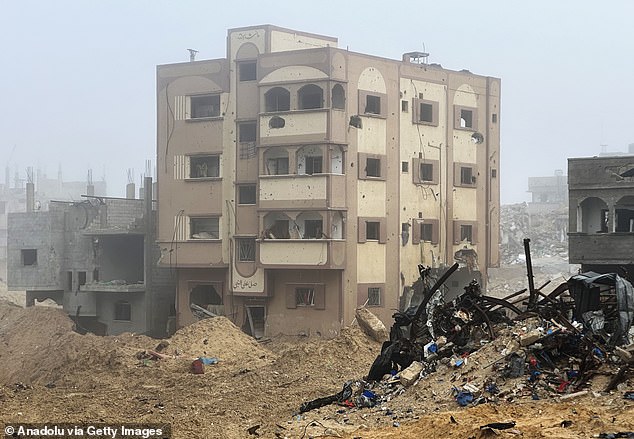
Demolished buildings, destroyed by Israeli airstrikes, such as the withdrawal of Israeli troops from some parts of Khan Younis
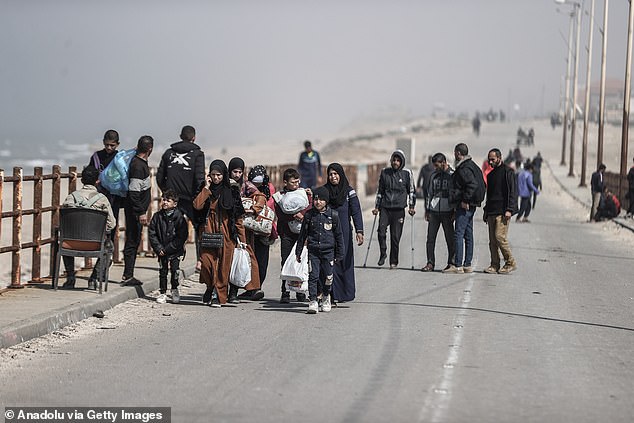
Rafah is the last refuge of the estimated 1.4 million Palestinians driven south
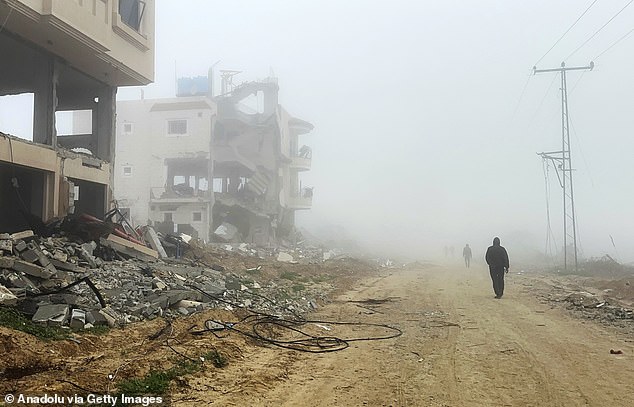
Israel previously warned that it would begin its invasion of Rafah on March 10, the start of Ramadan, unless Hamas returned the approximately 130 hostages remaining hidden in Gaza.
Israel previously warned that it would begin its invasion of Rafah on March 10, the start of Ramadan, unless Hamas returned the approximately 130 hostages remaining hidden in Gaza.
Diplomatic efforts to get Israel and Hamas to agree to a ceasefire are underway, and negotiators from Egypt, Qatar and the US met in Qatar’s capital Doha to work on the deal.
US representatives said the talks reached ‘an agreement’ on a ceasefire and the release of hostages
A senior Egyptian official has said the draft ceasefire includes the release of up to 40 women and elderly hostages in exchange for up to 300 Palestinian prisoners, mostly women, minors and the elderly.
The official, who spoke on condition of anonymity to discuss the negotiations, said the proposed six-week pause in fighting would include allowing hundreds of trucks to bring much-needed aid to Gaza every day, including the north.
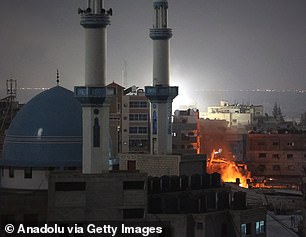
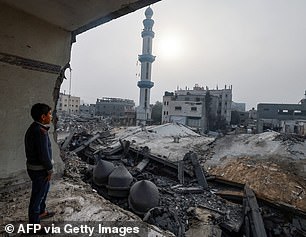
Israel has killed nearly 30,000 people, most of them women and children, in a devastating bombing and rocket campaign following Hamas’s Oct. 7 incursion.
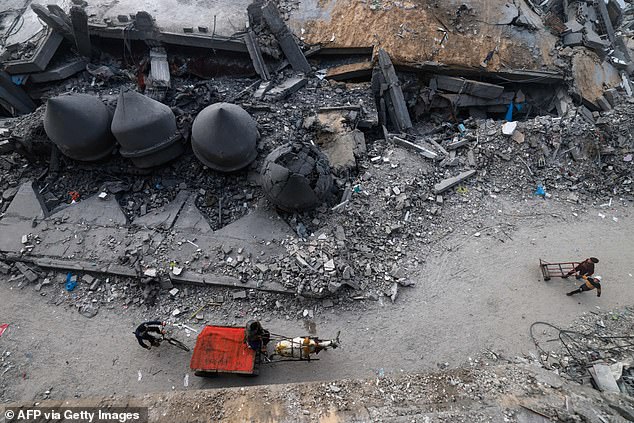
A donkey-drawn car passes the Al-Faruq Mosque, razed by Israeli bombing in Rafah
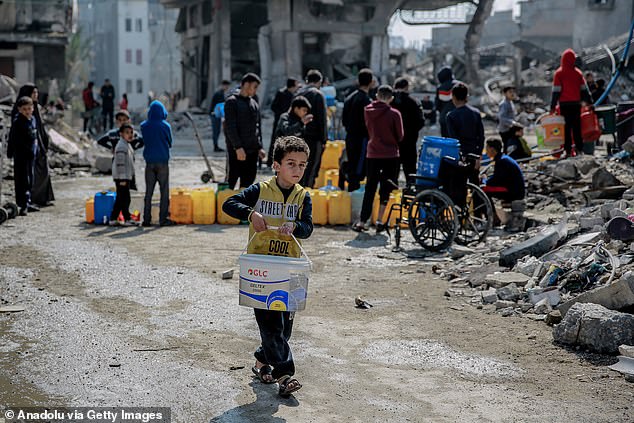
Palestinians wait with empty water jerry cans to refill them with clean water
He said both sides agreed to continue negotiations on further releases and a permanent ceasefire during the break.
Hamas says it was not involved in the latest proposal from the US, Egypt and Qatar, but the reported outline is largely in line with its previous proposal for the first phase of a ceasefire.
Hamas has said it will not release all remaining hostages until Israel ends its offensive and withdraws its troops from the area, demanding the release of hundreds of Palestinian prisoners, including senior militants – conditions Mr Netanyahu has rejected.
As diplomats meet in Doha, starving Palestinians have been pushed further south toward Rafah, prompting condemnation from the international community and questions about where the Palestinians will go if Israel begins attacking the tent city.
Neighboring Egypt has kept its border closed to a mass refugee flight, arguing that this will not help facilitate any Israeli operation to drive Palestinians out of Gaza.
But satellite images show the country has also built a walled fence next to Gaza in an apparent attempt to brace for the arrival of large numbers of refugees.
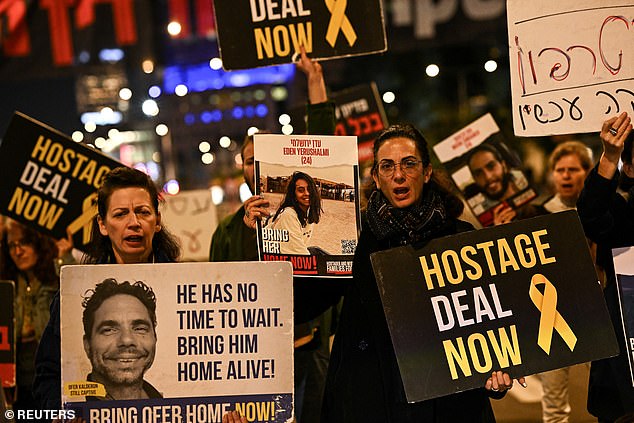
Within Israel, public pressure on Netanyahu has increased – both from desperate hostage families demanding faster action and from a resurgent anti-government protest movement.
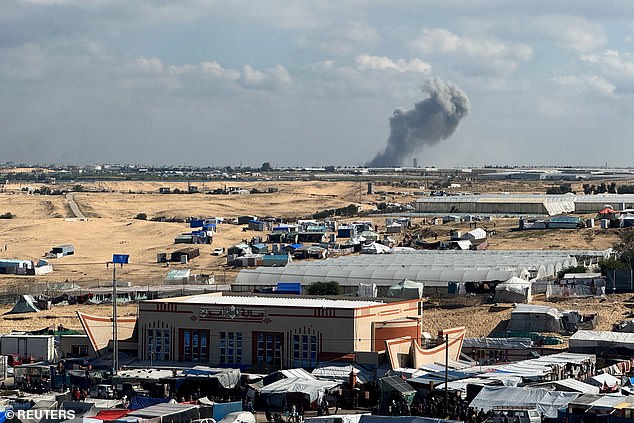
Smoke rises during an Israeli ground operation in Khan Younis, amid the ongoing conflict between Israel and the Palestinian Islamist group Hamas
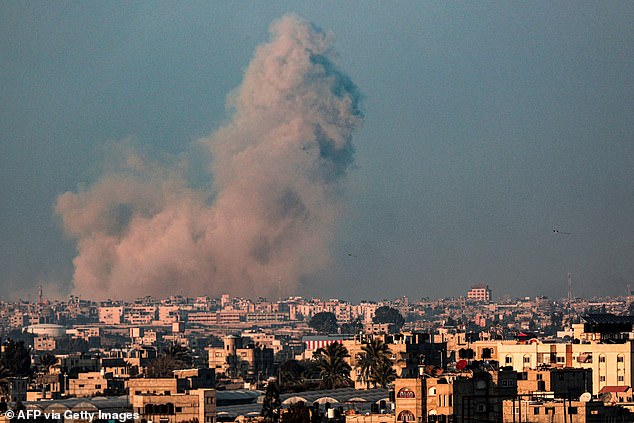
Smoke rises after the Israeli bombardment of Rafah in the southern Gaza Strip
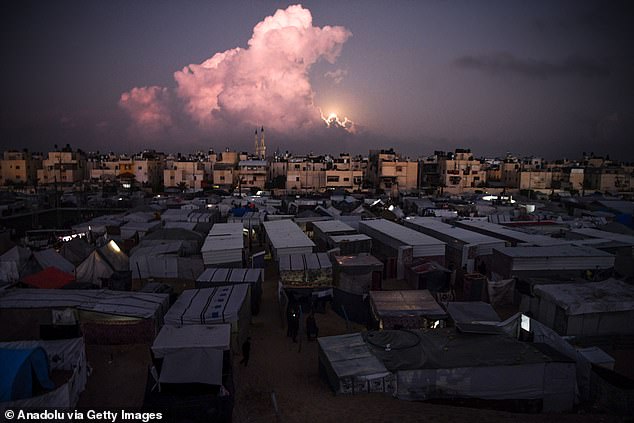
The humanitarian crisis in Gaza has spiraled, with the UN World Food Program reporting ‘unprecedented levels of despair’
Within Israel, public pressure on Netanyahu has increased – both from desperate hostage families demanding faster action and from a resurgent anti-government protest movement.
The humanitarian crisis in Gaza has spiraled, with the UN World Food Program reporting ‘unprecedented levels of despair’.
Red Crescent volunteer Ezzedin Halaweh said food shortages in the north “lead to serious health problems, especially among children.”
One father told AFP he had to try to feed his one-year-old daughter bread made from animal feed because he could not find milk.
She couldn’t digest the food. He said, ‘Our only hope is God, there is no one else to help.’
